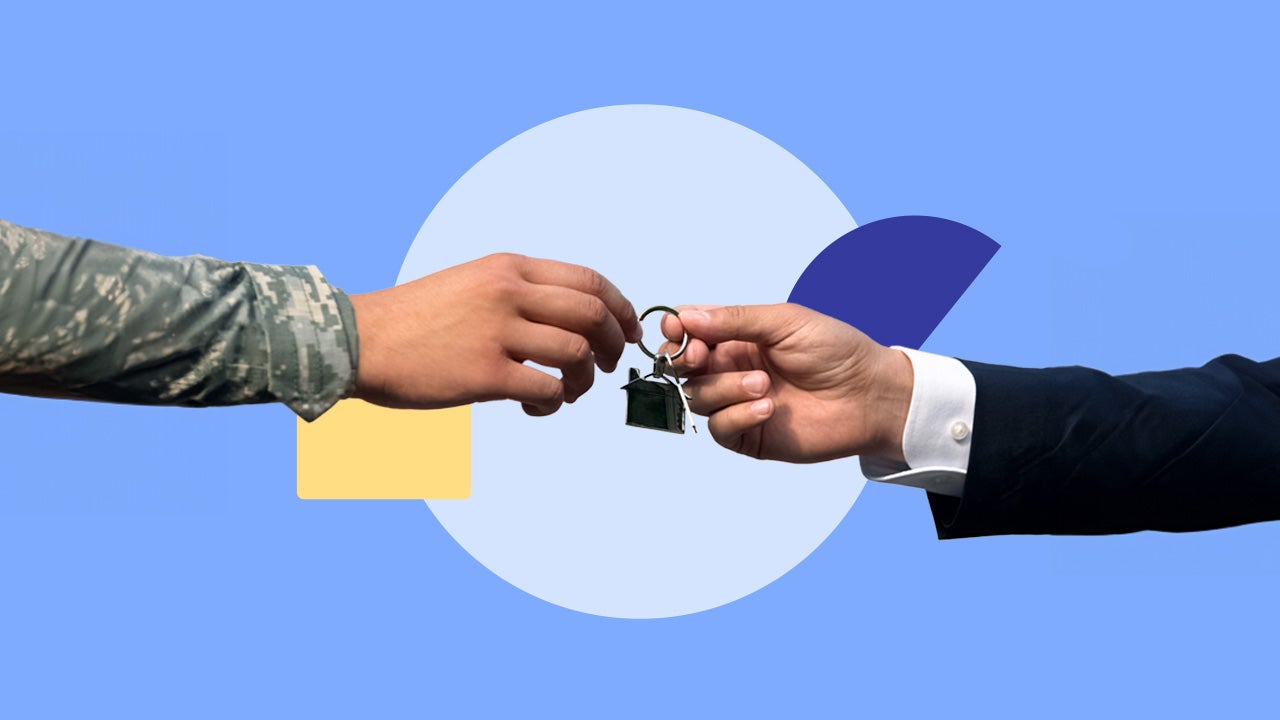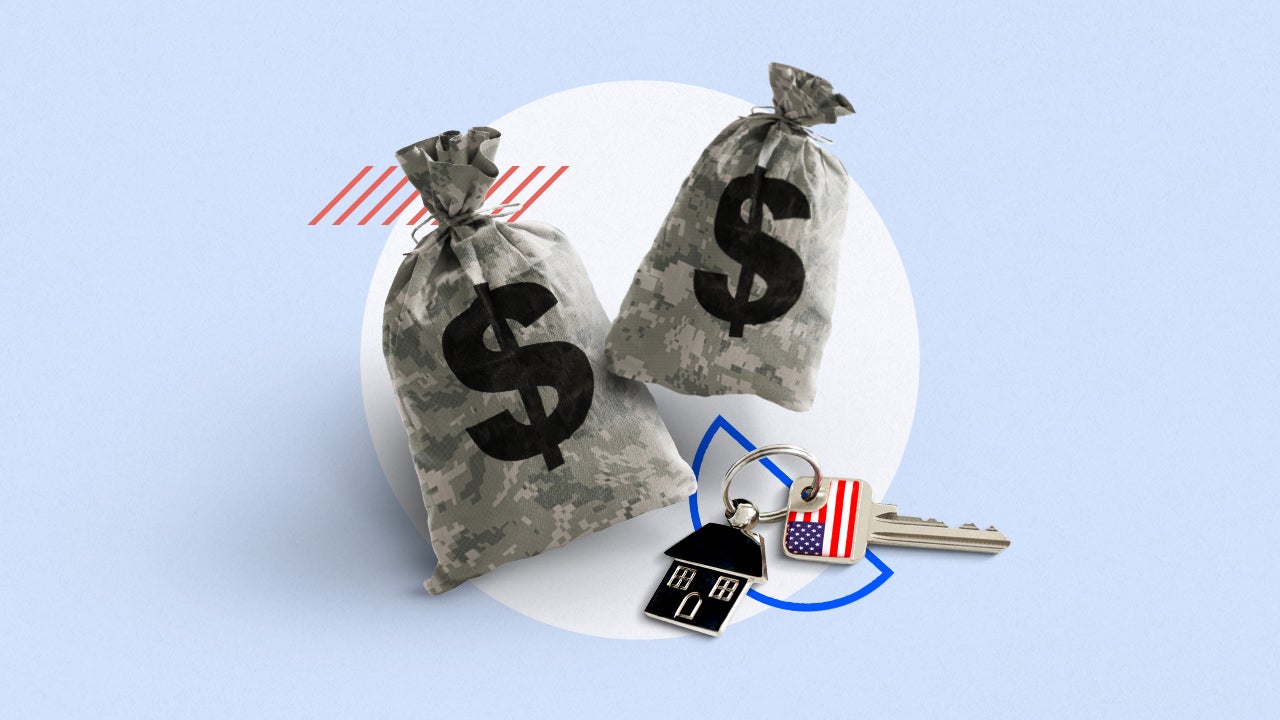Can active military get a VA loan?

Key takeaways
- Active-duty military members are eligible for VA home loans after serving for 90 straight days (181 days during peacetime) without an interruption in service.
- You or your spouse and dependents have to reside in your home as a primary residence for 12 consecutive months, but if you’re deployed you already meet this occupancy requirement.
- Your lender will require a Certificate of Eligibility, minimum credit score and low debt-to-income ratio, and you should hire a trusted real estate agent to help you find the right home remotely.
At any given time, a multitude of U.S. military personnel are deployed overseas. Although far from home, it’s possible for active-duty military abroad to get a mortgage — a VA loan or other type — and buy a home remotely. Here, we explore buying a house with a VA loan for active-duty military personnel who are currently outside the U.S.
Can active-duty military get a VA loan?
Yes, active-duty military members qualify for VA loans. You can qualify after serving for 90 consecutive days without a break in service, according to the U.S. Department of Veterans Affairs.
“Also, during peacetime, you must have served continuously for at least 181 days to meet the basic service requirements for a VA loan,” says Dana Hendrix, senior vice president of finance for DSLD Mortgage.
“This means serving six months straight without a break in service, such as in non-combat roles,” says Jeffrey Zhou, CEO and co-founder of Fig Loans. “Periods of schooling or training also count toward this requirement.”
VA loan credit and income requirements
To qualify for a VA loan, participating lenders commonly require:
- A credit score of 620 or higher
- A debt-to-income (DTI) ratio of 41 percent or lower
“Some lenders might accept lower credit scores but could require additional documentation or charge a higher interest rate,” adds Zhou. “Stable income is also needed, which can include your military pay, allowances and any secondary income.”
Be ready to furnish your most recent Leave and Earnings Statement (LES), which provides details about your current military status, income and basic allowance for housing (BAH) amount you receive.
“BAH serves as income that can increase your borrowing potential and lower your DTI ratio,” says Hendrix. As of 2025, BAH rates are 5 percent of the national average housing cost by pay grade, according to the Department of Defense. They range from $90 to $202 per month, depending on grade and dependency status.
VA loan residency requirements
If you purchase a home with a VA loan, you must:
- Move in within a “reasonable time” after your VA loan closes. “Reasonable” is defined as 60 days but can be longer if you can certify that you’ll live in the home by a specific date within 12 months of the closing. If you are on active duty and can’t meet the “reasonable” standard, a spouse or a dependent child can live in the home to satisfy this occupancy requirement.
- Live in your home as a primary residence for 12 consecutive months. Of course, doing so can be difficult if you are on active duty and deployed overseas. However, deployed active-duty servicemembers are given temporary duty status. As a result, they automatically meet the occupancy requirement, according to the VA loan guidelines.
How to apply for a VA loan while overseas
Navigating the homebuying process and applying for a VA loan while you’re not physically present can be tricky, but following these steps can help:
- Get your Certificate of Eligibility (COE): This proves your military service and makes you eligible for a VA loan. Fortunately, since you can request your COE online or by mail, you can do this and prove your military service from anywhere in the world while you’re deployed. “To get your COE, you will likely need to provide documentation such as your Leave and Earnings Statement,” says Hendrix. “Additionally, you may need to submit your military orders or a statement of service from your commanding officer that verifies your active-duty status and the length of your service.”
- Find your lender: To get a VA loan overseas, you’ll need to work with a lender who offers VA loans. Most lenders have websites with the information you’ll need to get started, from loan officers’ email addresses to online loan applications. Compare offers from at least three VA lenders to find the best VA loan rate.
- Get a real estate agent: Since you’ll be unable to look at houses in person, you want someone you can trust to evaluate properties for you. A good real estate agent goes a long way here. You’ll need to put in extra work to find an agent you can trust.
- Find your house: Between your agent, any friends or family you have in your desired buying area and online resources like 3D walkthroughs or video tours, you can house hunt from anywhere. However, you won’t be able to see the house in person before you buy. Before you commit to a property, have it inspected and appraised.
- Buy your house: When the seller accepts your offer on the house and the lender approves you for a VA loan, you can finalize your home purchase. But you’ll need to handle all of the home purchase and VA loan paperwork digitally. Still, thanks to e-sign capabilities, you should be able to do everything from wherever you’re deployed. You’ll come home from deployment with a house waiting for you.
Learn more: Should you apply for a mortgage online?
In addition, consider that, while deployed, you can appoint a person or entity to represent your interests in purchasing a home with a power of attorney (POA). You’ll need assistance from an attorney, legal clinic or a Judge Advocate General to grant a POA. Any of these professionals can also recommend additional legal measures to take, depending on your situation. In many cases, military members grant a POA to a spouse so the spouse can do tasks like signing paperwork on their behalf. As you consider who to appoint, ask these questions:
- What powers will you allow the person to have?
- Do you want to establish limitations?
- How long will the POA last?
- Can you revoke the POA at any time?
- Can you name a backup?
You’ll also want to confirm with the closing or title agent what POA documentation they’ll need to close on your mortgage.
Can you use a VA loan on overseas property?
No, you can’t use a VA loan to buy international property — even if you’re serving overseas. The VA only guarantees loans to buy homes in the U.S. and U.S. territories and possessions, including Puerto Rico, Guam and the U.S. Virgin Islands.
Bottom line
Getting an active-duty VA loan while overseas is more complicated than doing it at home, but it’s definitely possible. To qualify, you’ll need to meet certain eligibility criteria, including serving a minimum number of days — either 90 or 181, depending on whether it’s wartime or peacetime. You’ll also have to meet the VA loan program’s credit, income and residency requirements.
FAQ about getting a mortgage while overseas
Why we ask for feedback Your feedback helps us improve our content and services. It takes less than a minute to complete.
Your responses are anonymous and will only be used for improving our website.







